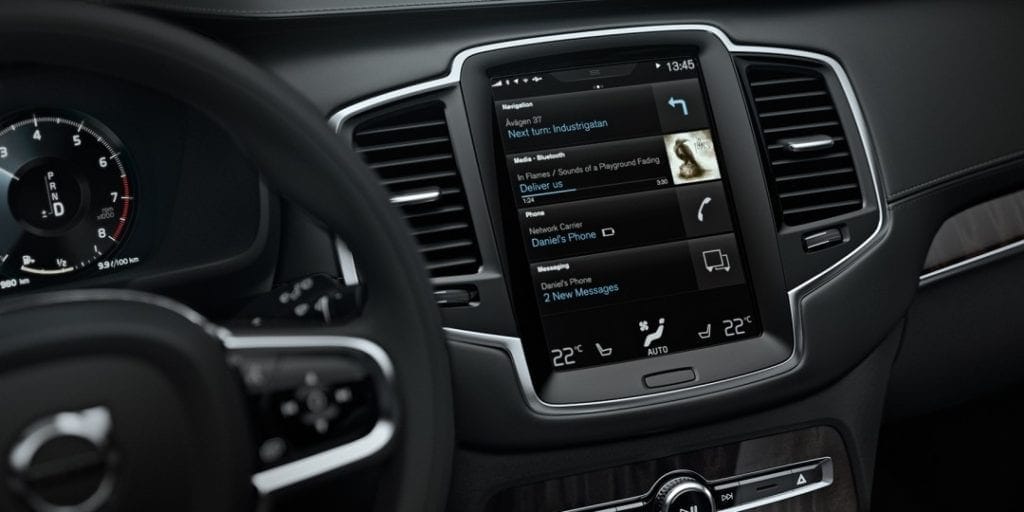2018 is coming and for tech-savvy drivers in the market for a new vehicle, the New Year means new gadgets. Automobiles today are becoming increasingly sophisticated, and while reliability, safety and the powertrain remain at the top of buyers’ importance lists, technology is a major selling point too.
Technology can be a helpful addition to a vehicle, but safety features should be on the top of every car owner’s list. Features like premium stereos, heated seats, and automatic parallel parking are nice to have. Safety features that assist the driver and benefits everyone on the road should take top priority. All else can be considered later.
Below are five of the must-have technological components to look for when buying a new car this year and to keep everyone safe on the road.
1. Connected Mobile Apps
Smartphones have changed the way drivers interact with their vehicles substantially over the years. While many carmakers now offer some sort of connected smartphone app, it’s best to do some research to find the right one for you.
Apps that allow car owners to lock and/or unlock their vehicle remotely are great for extra security needs. There are also handy mobile apps that will keep the driver updated on things like fuel, oil, and tire pressure. Certain connected mobile apps can even start your vehicle for you on cold mornings. When you’re ready to go, your car seats will be warm and toasty.
Such apps can come in handy for those of us running a busy schedule. The only downside is that car-makers may charge a monthly or yearly fee for the service.
2. 360° Camera
Have you ever wanted to have eyes in the back of your head? This is as about as close as you can get.
A 360° camera system can make life a lot easier for drivers as a majority of low-speed crashes occur during parking. A camera on every side of the vehicle, plus modern day computing power, equals a much more aware driver. Drivers can get invaluable assistance with a virtual top-down view of their surroundings. With a 360° camera system, tasks such as backing out of the garage or properly lining up in a tight parking spot are much easier to perform.
3. Automatic Emergency Braking
While drivers should always be aware of the road around them, it doesn’t hurt to have a little backup, just in case. With a variety of sensors in place, the Automatic Emergency Braking or AEB kicks in as a last resort when an imminent forward collision crash is detected.
As its name suggests, automatic emergency braking will hit the brakes automatically to avoid a collision. This safety feature is extremely good and a worthy investment, but drivers should keep in mind that automatic emergency braking is not a replacement for the brake pedal. It’s a handy tool for older drivers who may not be able to react as fast as they’d like.
By 2022, Automatic Emergency Braking will be standard on all cars. These include all Audi, Mercedes Benz, Ford, BMW, Toyota, General Motors, Mazda, Tesla, Volkswagen, and Volvo models sold to the public.
Fortunately, drivers don’t have to wait until then to get an automatic emergency brake system. A lot of car manufacturers already offer automatic emergency braking in some of their current models. Be sure to inquire about it when shopping for new Subaru cars at your local dealer.
4. Lane Departure Warning
Sometimes drivers pay more attention to what’s happening in the back seat and less attention to the road. We’ve all been there at one point or another. By the time our eyes are back on the road ahead we find our vehicle drifting towards the wrong lane.
Lane departure warning is a safety feature that should alleviate such instances of distracted driving. Lane departure warning uses cameras to determine if and when a vehicle has drifted over a marked lane line. When lane drifting occurs, drivers are alerted visually, audibly, or even through vibration of the steering wheel.
A lane departure warning turns off automatically when the driver uses a directional to avoid an accidental engagement.
5. Wireless Charging
Having phone charging cords snaked through the vehicle can be annoying. Fortunately, more and more new cars have been fitted with wireless charging pads. With the addition of wireless charging pads, the need for charging cords become a thing of the past. Drivers can focus on the road as their phone charges and passengers won’t have to worry about getting tangled up in unnecessary cords. At the end of the trip, everyone’s happy.







